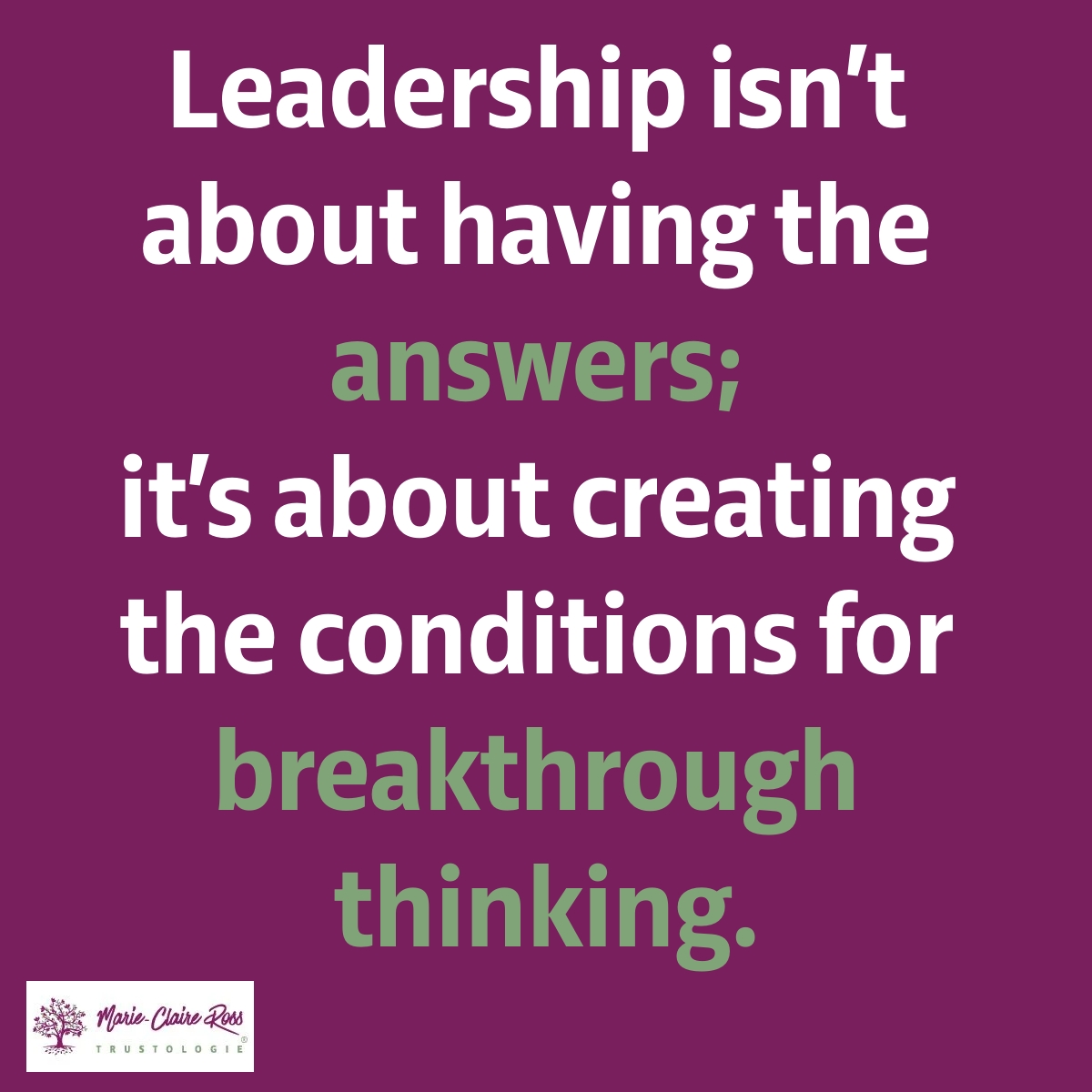8 min read
Beyond the "Why": 5 Coaching Secrets to Unlock Curiosity in Leadership
When my daughter was 17 months old, she discovered a superpower: the word “Why?”For the next two years, it was her response to almost everything.
Develop leaders, strengthen executive teams and gain deep insights with assessments designed to accelerate trust and performance.

Transform how your leaders think and perform with keynotes that spark connection, trust and high-performance cultures.

Explore practical tools, thought-leadership and resources to help you build trusted, high-performing teams.

Trustologie® is a leadership development consultancy founded by Marie-Claire Ross, specialising in helping executives and managers build high-trust, high-performing teams.

5 min read
Marie-Claire Ross : Updated on February 24, 2021

Humans are designed to avoid conflict. Employees fear speaking up about issues in case it makes them look stupid or unpopular. Having the courage to be vulnerable in a high stakes situation takes a lot of guts.
Being nimble and adaptive is a business requirement for success, but it will never occur in an organisation where people are afraid to speak up. Addressing painful truths is the way to growth. After all, if you don’t get the unpleasant stuff out of the way, you can waste a lot of time. It’s hard to get moving on anything if people won’t talk through issues or how to resolve them.
A study by VitalSmarts found that rather than talking about issues, employees were engaging in resource-sapping behaviours such as: complaining to others (78%), doing extra or unnecessary work (66%), ruminating about the problem (53%), or getting angry (50%).
These are costly behaviours. The same research found that the average person wasted seven days undertaking these dysfunctional problems instead of talking about it. A shocking 40% of respondents admitted to wasting two weeks or more.
Silence damages deadlines, budgets, relationships, turnover, employee engagement and meeting goals. If the culture is really toxic, high performers leave and leaders spend most of their time fixing people issues than actually working on the business.
It also reduces customer satisfaction. If companies refuse to listen to a customer's point of view, or make out the customer is at fault, clients leave.
But understanding why people don’t speak up is not just because people don’t feel safe. It can happen in teams that like being together. That's why it's helpful to understand the powerful magnetic pull of groupthink.
Groupthink is when decision making suffers when a cohesive group becomes insulated from dissenting viewpoints. Team members become so comfortable with one another that they are unaware of the subtle pressures to be unanimous in decisions.
In the Harvard Business Review article, Candour, Criticism and Teamwork by Keith Ferrazzi, he discussed his research of executives at six top banks to gauge their level of candour. Teams that scored low on candour had the poorest financial returns among those banks during the global financial crisis. In contrast, teams that openly spoke about risky securities, lending practices and other potential problems were able to preserve shareholder value. In fact, further research into 50 large companies found that high performance could be predicted through identifying “observable candour.”
Groupthink goes unnoticed because for many of us it is a safe and comfortable mode of operating. We go with what the group says because we don’t want to seem disagreeable and risk being disliked.
It plays out with team members always agreeing with what is being said and an inability to raise uncomfortable issues. Rather than confront realities, leaders and team members shut down discourse about past mistakes. They ignore customers feedback. Employees are often more keen to ensure the relationships with others in their team are harmonious than ensuring the customer is happy.
This is detrimental to transforming an organisation because mistakes are seen as embarrassing rather than an opportunity to learn and improve. It puts the organisation at risk of competitors out-innovating and taking customers.
For example, a CEO brought me in to work with her leadership team as there was conflict and a refusal to accept the new strategy. During a workshop I facilitated, the CEO was able to share her concerns with the team about speed decreasing and leaders not working together. Executives were clearly shocked and discussed why the CEO was incorrect. The good news was they were debating (and being aware of a new viewpoint). But the bad news was they were in serious denial about how their camaraderie was masking a lot of hidden issues that were frustrating a lot of them. It took some data, coaching and another workshop for them to come around and start being more open and honest.
Having worked with various executive teams, the biggest stumbling block to understanding why things need to change is the pretense that things are perfect. It doesn’t matter if the CEO tells them the problem, customers or even other managers in the business. Senior executives wrongly assume that their ability to chat nicely together or even like one another means that they are doing okay. Unfortunately, they are confusing talking at people, as being the same as getting things done. The reality is while leaders might appear to spend time talking, their dialogue is superficial and unproductive. Most are chronically unaware that they are withholding important information, avoiding accountability or conflict, not asking the right questions, acting defensively, accepting questionable strategies or offering few suggestions.
At the heart of it all, teams are under the spell of the compelling myth that communication is about talking (at people, or shouting, depending on the team dynamics). It’s not. It’s about productive dialogue around strategy and how to effectively co-ordinate requests and promises across an organisation. This requires truth-seeking conversations that debate, challenge and get under the hood of important issues, in order to free up bottlenecks and reallocate resources. Productive dialogue is difficult and requires the CEO to champion a psychologically safe space where members can talk candidly and honestly with one another. Leaders need to actively agree publicly on their commitments, suggest counteroffers when the work can’t be done at the required time (or quality) or make plain refusals.
But let’s be clear about one thing. There is nothing wrong with a bit of strife and tension in a team. Healthy debate is what is needed to reduce the tendency towards groupthink and to really flesh out the feasibility of strategic initiatives. It’s a good thing. Without robust discussion, you get mediocre ideas and a lack of commitment. As Joseph Joubert said: “It is better to debate a decision without settling it than settling a decision without debating it.”
Strife and tension are only an issue if personal insults are being hurled or it’s all silent with people being too afraid to openly talk about it. The result is sabotage behind the scenes and a lack of action in the right direction.
But you know that you have a psychologically safe team when employees are respectful and feel obligated to be candid. They ask questions to ensure they understand a situation or perspective, they ask for help from their colleagues or their point of view and they openly admit they are behind schedule. And they make sure they do those same behaviours with customers.
In my experience, I have found that what trust really does is enable everyone in an organisation to have open, honest conversations. It ensures the right types of conversations occur to improve performance and enable change. This means everyone can confidently rely on their colleagues or other teams to do the right thing. They know that when work gets stressful and into the high risk category they can trust their boss to not blame them when things go wrong and that other departments will deliver on time and at the right standard.
It’s time that we all started talking honestly – not just leaders but those on the frontline. And this doesn’t give people license to say what they want without caring about other people’s feelings or doing it to prove that they are right. Leaders need to have the skills to weed out these toxic behaviours.
Let’s face it the world is changing and staying quiet about poor behaviours or decisions allows them to flourish. Not only does it make the situation worse, but employees feel powerless, unsatisfied and often suffer from poor health. It’s time we all started to feel more comfortable about talking through issues rather than bottling them up or moaning about it. Whether it’s something as severe and damaging as sexual harassment in the workplace which has been brought to light with the recent Brittany Higgins case in Australia. Or something as simple as not agreeing with a new strategic move.
The only way to encourage honest conversations is for us to change how we receive them. We need to get better at hearing the stuff we don't want to know about. This requires strong leaders who refuse to allow groupthink and an avoidance of being uncomfortable to rule how people interact in the workplace.
But it also requires every employee demonstrating emotional maturity and discussing issues rather than complaining and ruminating. It means learning how to speak up in meetings and being open to listen to negative feedback without being defensive. The sooner we all take responsibility for our actions and realise we have more power to do good than to do harm, the better it will be for our workplaces.

8 min read
When my daughter was 17 months old, she discovered a superpower: the word “Why?”For the next two years, it was her response to almost everything.

11 min read
I have a friend who often finds herself at the mercy of her emotions. Recently, she called me to rehash a confrontation she’d had with a group of...

9 min read
True leadership presence isn’t a performance or a set of charisma hacks; it is the felt experience of who you are being in the room. By cultivating...

One of the things that both chairs and executives tell me with pride is how their leadership team functions so well together. Interestingly, most of...

Have you ever heard about the surprisingly positive influence teachers have on students when they hold high expectations for their academic abilities?

One of the lowest points in my life was when my market research career ended abruptly because of sociopaths who destroyed my reputation. I've never...